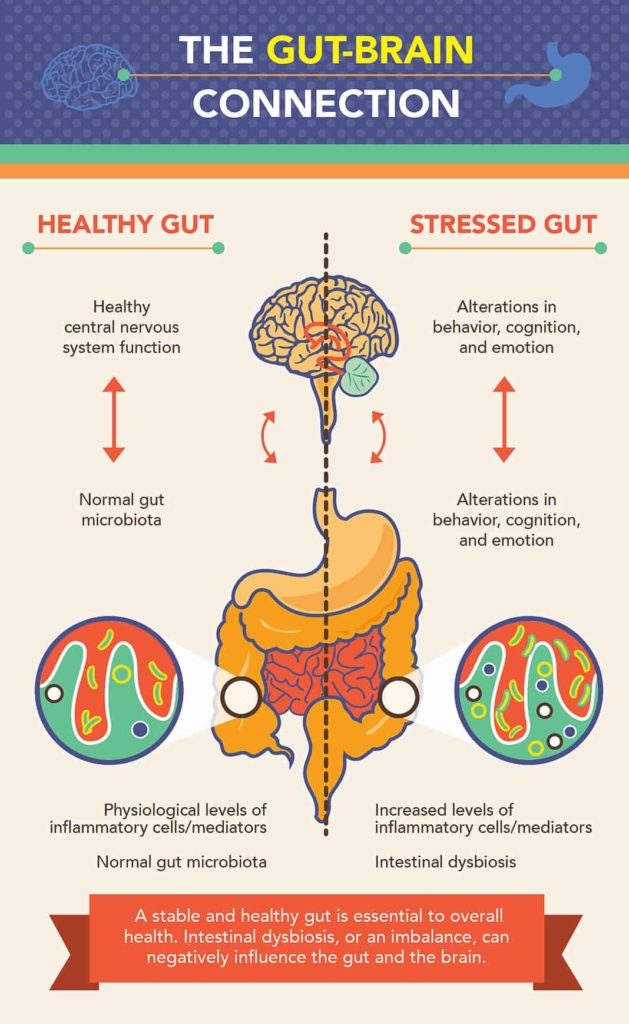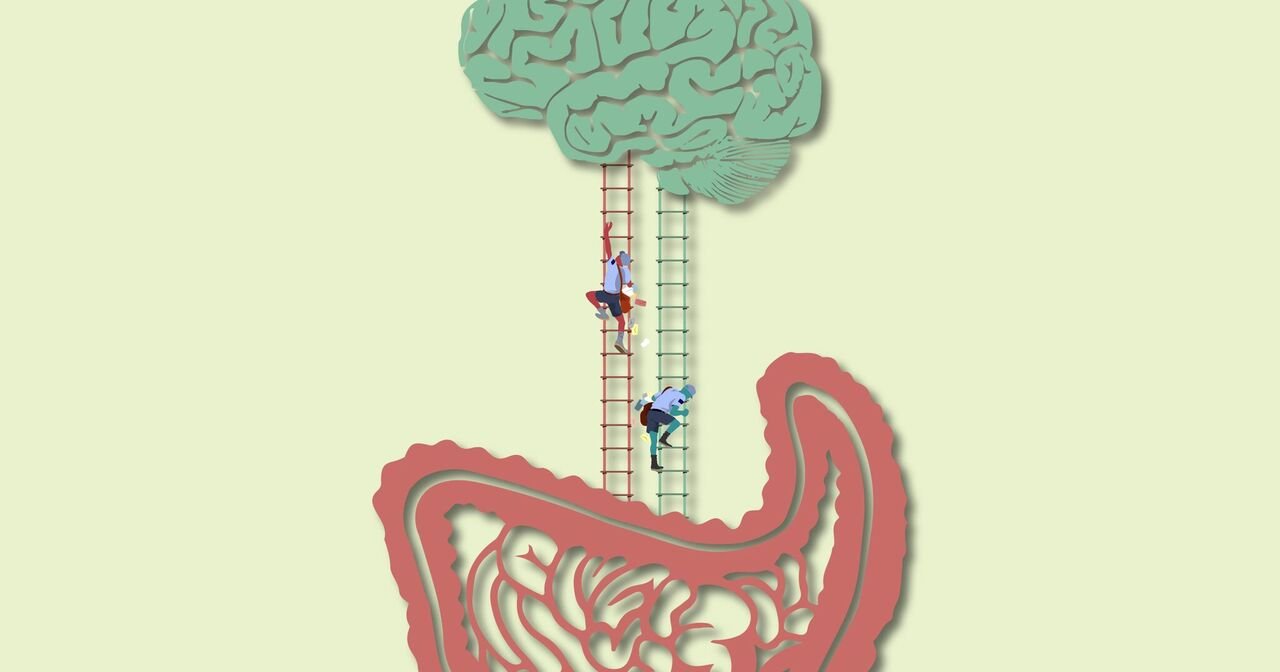You’ve probably heard about the importance of gut health and how it can affect almost everything else in your body. This is not far from true. Everyday more and more research comes out supporting the notion that our guts are heavily involved in our overall health, and mental health is no exception. This is where the gut-brain connection comes into play.
Different branches of medicine that don’t deal directly with the digestive system are starting to become more and more interested in the effects of gut health in different health conditions. Psychiatrists, neurologists, endocrinologists, and immunologists are all starting to look at the effects of the GI tracts’s processes in their specific area of focus, and many of them are coming to the consensus that the connection between the gut and the rest of the body’s systems can’t be looked at independently.
Neuroscientists around the world seem to have a newfound fascination for the connection between the gut and the brain, and with every passing study the link between what we eat and how we feel, not only physically but on an emotional level, seems to be more and more apparent.
Due to this now undeniable connection between gut and brain, many experts in the fields of psychiatry, psychology, and clinical counseling are starting to integrate food awareness into their practices.
Ongoing research focuses on what we know as the gut-brain connection and how an unhealthy gut can ultimately lead to an array of mood disorders like anxiety and depression.
Let’s take a look into how our gut health can affect our mental health.
The gut-brain connection
The gut has been referred to as the “second brain” because of how strongly its processes influence the nervous system. The two systems are in constant communication and what happens in one can directly affect the other.
To understand the brain-gut connection it is helpful to understand the basic functioning of the gut.
What we call the gut refers to the entire gastro-intestinal (GI) system and all of the living microorganisms that live within it, also known as gut microbiota or gut flora. The organs along the GI tract and the gut flora work in a balanced, symbiotic manner to maintain not only proper digestion, but also several other processes in the body.
To get a deeper understanding of how the gut works and the systems it influences you can take a look at our article Gut Health: What is it and why does it matter?
The gut and the brain have a bilateral relationship. The gut communicates through the nutrients it absorbs that carry out processes to activate hormonal and nervous system processes. These processes are then integrated by the central nervous system (CNS) and endocrine system to generate appropriate responses from the brain to send back to the rest of the body. [1]
This bilateral connection is known as the gut-brain axis. The mutual nature of this relationship means that anything that affects the gut can have an effect on the CNS and vice-versa. This is why so many mental health or neurological issues seem to have a correlation with gut health disturbances.

Gut health and mood disorders
The details and nuances of the link between mental health and gut health is still being researched and explored, but the connection is a known fact and has been observed in many research procedures.
Dysbiosis (low diversity of healthy gut bacteria) is one of the main disturbances that can create ideal conditions for disease and mental health disorders to thrive in. When we lack the necessary levels of healthy gut bacteria we are prone to many mood disregulations and neurological imbalances. Similarly, exposure to emotional stress, trauma, or other severe psychological conditions can lead to a debilitated gut ecosystem.
This bilateral nature of the gut-brain axis can make it dificult to pinpoint the cause of a specific condition (it becomes a case of chicken and egg). For many, a disturbed gut balance can lead to mood disorders, for others, a mood disorder can wreak havoc on the delicate gut balance.
Whichever way the wheels spin, the cycle perpetuates itself, and addressing issues from both sides can be the most effective way to treat a mood disorder.
Let’s take a look into some of the ways in which the gut microbiome’s state has been linked to different mental health conditions.
Gut health in anxiety and depressive disorders
Chronic anxiety and depressive disorders (from minor and temporary disorders to major depressive disorder) are some of the most common mental health difficulties today, and the numbers of those suffering with either or both of these conditions is rapidly scaling. It makes you wonder if there is something in the water (or in the food).
Depression and anxiety disorders on a physiological level are related to disturbances in the hypothalamic–pituitary–adrenal gland (HPA). The HPA is our central stress response system, and excessive activity in the HPA is a direct precursor to depression and anxiety disorders. [2]
A healthy gut ecosystem can help the body cope with stress adequately by regulating HPA activity, but in the case of a weakened gut microbiome, the resistance to stress is lowered which can make us more susceptible to stress related disorders that can burden our mood and emotional health even further.
So, lifestyle behaviours that affect our gut negatively (like a poor diet or excess alcohol) can lead to mood disorders like general anxiety disorder or minor and major depressive disorders.
The correlation between microbiome and emotional behaviour has been observed in lab settings showing a clear and consistent relationship between the two.
Many studies have observed the differences in emotional behaviour between germ free rats (rats that have been subject to significantly reduced microbiomes) and rats with normal gut microbiome. They observed that reducing gut microbiome (through antibiotics or other stressors) can induce anxiety and depression-like behaviours [2]. On the other hand, supporting the livelihood of the microbiome through prebiotics, probiotics, and fermented foods, has shown to alleviate depression and anxiety symptoms. [3,4]
All in all, the correlation seems strong. A healthy gut can lead to a healthy mind.
Gut health in other neurological disorders
Gut health (or lack thereof) has also been studied in relation to different mental health disorders and neurological diseases. Researchers have found that the gut microbiome of healthy or neurotypical individuals is different from that of individuals with different neurological conditions.
Other neuropsychiatric conditions such as ADHD (attention deficit and hyperactivity disorder) and ASD (autism spectrum disorder) have also shown pattens of altered gut microbiome as a recurring feature. [7]
In addition to diverse mood disorders and neurodivergent conditions, there is a clear correlation between poor gut microbiome levels and chronic neurological diseases like Alzheimer’s and Parkinson’s disease.
Several gut-related issues like dysbiosis, SIBO (small intestine bacterial overgrowth), and intestinal inflammation are all contributing factors in the development of Parkinson’s disease. [5] In fact, many preventative medicine approaches are looking into using gut health markers in addition to other biomarkers to help early diagnosis of neurological diseases like Parkinson’s. This research is still new and needs space to grow, but there is hope that biomarkers including GI tract functioning can be used as a safe, early diagnosis. [6]
Although research in this area is still new and growing, the connections between gut health and neuropsychiatric conditions already observed are promising for further study, and this area of research has the potential to open the field to alternative ways to treat and understand mental health and neurological conditions.
The bottom line
Our guts are directly related to a wide range of systems in the body, and any dysfunction in the GI tract or its microbiome can have effects on our overall wellness. Mood disorders and other neurological conditions have been linked to gut health issues like dysbiosis and inflammation.
Taking an active role in supporting your gut health can help reduce the risk of cognitive decline and neurological diseases. It can also help improve your mood and overall vitality. Want to learn how to keep your gut healthy? Check out this article for 10 rules for a healthy gut.





